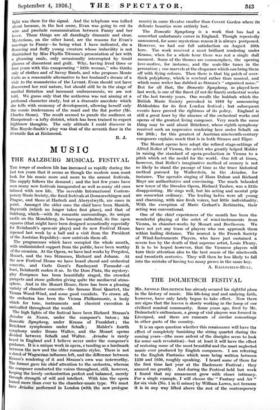MUSIC THE SALZBURG MUSICAL FESTIVAL
'THE tempo of modern life has increased so rapidly during the last ten years that it seems as though the modern man must look for his music more and more to the annual festivals. The supply follows the demand ; and the last few years have seen many new festivals inaugurated as well as many old ones infused with new life. The movable International Contem- porary Music Society, the fixed festivals at Donaueschingen and Prague, and those at Harlech and Aberystwyth, are cases in point.. Amongst the older ones the chief have been Munich,' Bayreuth (which no longer takes first place), and that of Salzburg, which—with its romantic surroundings, its unique castle on the Monehberg, its baroque cathedral, its fine open squares (that might have been designed acoustically especially for R einhardt's open-air plays) and its new Festival House (opened last week by a ball and a visit from the President, of the Austrian Republic)—now outrivals them all.
The programmes which have occupied the whole month, with undiminished support from the public, have been worthy of the occasion. At the Opera, we have had works by Pergolesi, Mozart, and the two Strausses, Richard and Johann. At the new Festival House we have heard choral and orchestral concerts, and Carlo Gozzi's flamboyant Turandot—at least, Reinhardt makes it so. In the Dom Platz, the mystery- play Everyman has been beautifully staged, the crowded parapets and stone galleries giving quite the mediaeval atmo- sphere. And in the Mozart House, there has been a pleasing variety of chamber concerts—the famous Roze Quartet, the Vienna Wood-Wind, and some good vocalists. To crown all, the orchestra has been the Vienna Philharmonic, a body which for tone, instruments and classical execution is unrivalled throughout the world.
The high lights of the festival have been Richard Strauss's ..lriadne in Naxos, under the composer's baton ; his Domestic Symphony, under Krauss of Frankfort ; the Bruckner symphonies under Schalk ; Mahler's fourth sYronhony under Bruno Walter, and the Mozart operas divided between Schalk and Walter. Ariadne is rarely heard in England and I believe never under the composer's guidance. It is a unique work in opera, s tanding as a landmark between the new and the older romantic styles. There is not a shred of Wagnerian influence left, and the difference between Krauss's rendering of it and Strauss's own was noteworthy. The former gave his chief attention to the orchestra, whereas the composer conducted the voices throughout, still, however, heeling the lovely orchestration perfect and balanced, merely through grength of will and intellect. With him the opera leaned more than ever to the chamber-music type. We must have Ariadne performed in London (with the new prologue music) in some theatre smaller than Covent Garden where its delicate beauties were entirely lost.
The Domestic Symphony is a work that has had a somewhat unfortunate career in England. Though repeatedly announced, for some mysterious reason it is always postponed. However, we had our full satisfaction on August 26th here. The work received a most brilliant rendering under Krauss, when for a whole hour there was not a single dull moment. Some of the themes are commonplace, the opening
love-motive, for instance, and the scale-like tunes in the peroration ; one marvels at the eloquence which can bring them off with flying colours. Then there is that big patch of over- thick polyphony, which is cerebral rather than musical, and
which some writer has dubbed as Strauss's "organized noise." But for all that, the Domestic Symphony, as played here last week, is one of the finest (if not the finest) orchestral works
of the last twenty years. One recalls the hubbub which the British Music Society provoked in 1919 by announcing
Heldenleben for its first London festival ; but subsequent
events have proved the rightness of its policy. England is still a great loser by the absence of the orchestral works and
operas of the greatest living composer. Very much the same thing may be said about Bruckner, whose eighth symphony received such an impressive rendering here under Schalk on the 28th; for this greatest of Austrian nineteenth-century composers explains much that is in both Strauss and Eiger.
The Mozart operas here adopt the refined stage-settings of Alfred Roller of Vienna, the artist who greatly helped Mahler in raising the standard of opera-production in Vienna to a pitch which set the model for the world. One felt at times, however, that Roller's imaginative method of scenery is not so likely to stand the passage of time as the truer historical
method pursued by Wallerstein, in the A.riadne, for instance. The operatic singing of Hans Duhan and Richard
Mayr are authoritative and convincing. The much belauded new tenor of the Dresden Opera, Richard Tauber, was a little disappointing. He sings well, but his acting and mental grip are somewhat ordinary. The leading ladies were all young and charming, with nice fresh voices, but little individuality. With the exception of Marie Gerhart's Zerbinetta, their acting was conventional.
One of the chief experiences of the month has been the wonderful playing of the octet of wind-instruments from Vienna, in chamber-works by Mozart and Beethoven. We have not yet any team of players who can approach them within hailing distance. The nearest is the French Society of Wind-Instruments Players, who have just sustained a severe loss by the death of that supreme artist, Louis Fleury. It is to be hoped however, that the Viennese players will turn their attention also to the best music of the nineteenth and twentieth centuries. They will then be less likely to fall into the mistake of having too many pieces in the same key.
A. EAGLEFIELD-HULL.


































 Previous page
Previous page